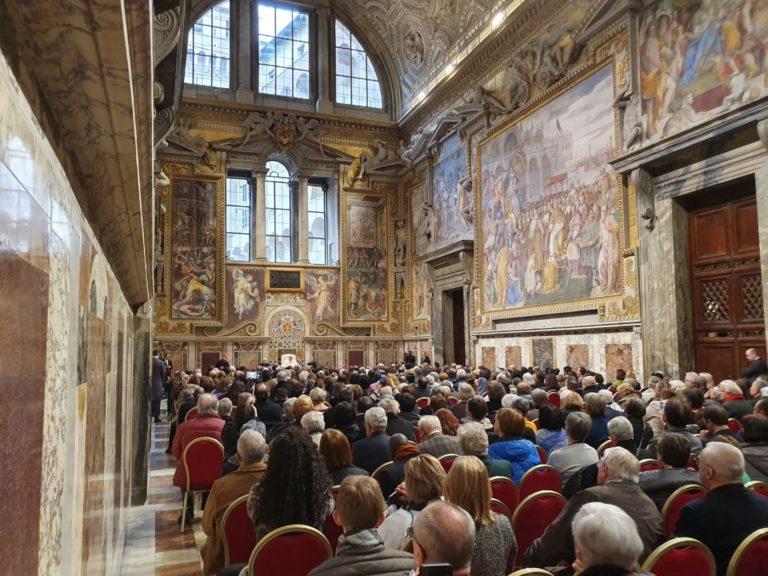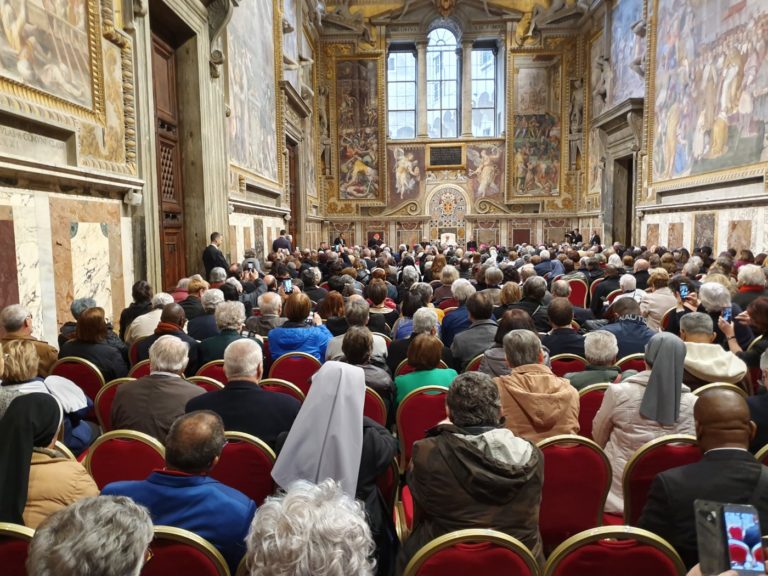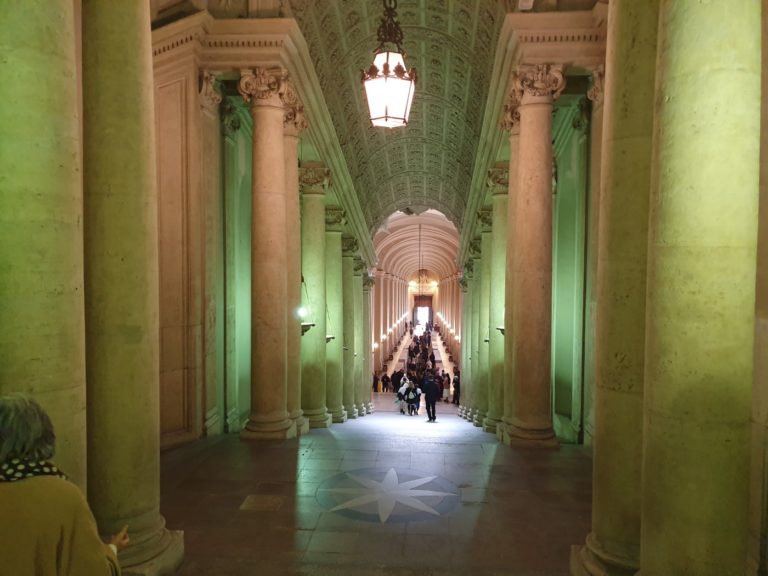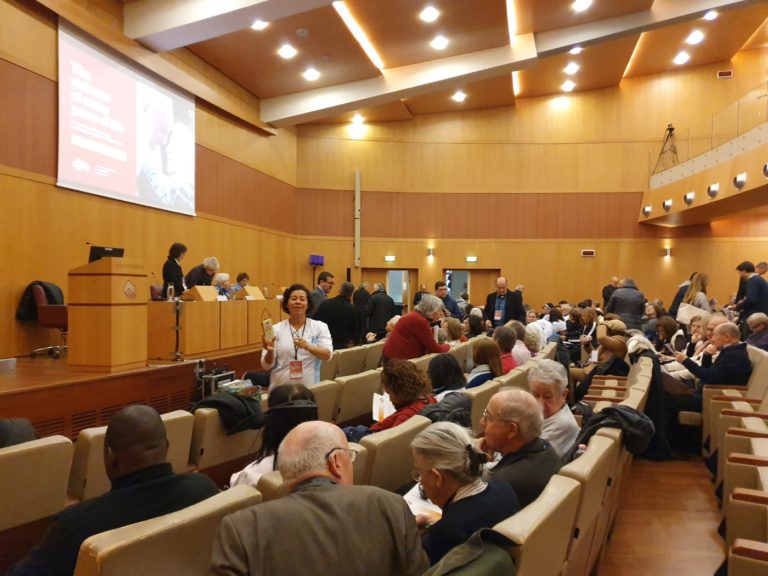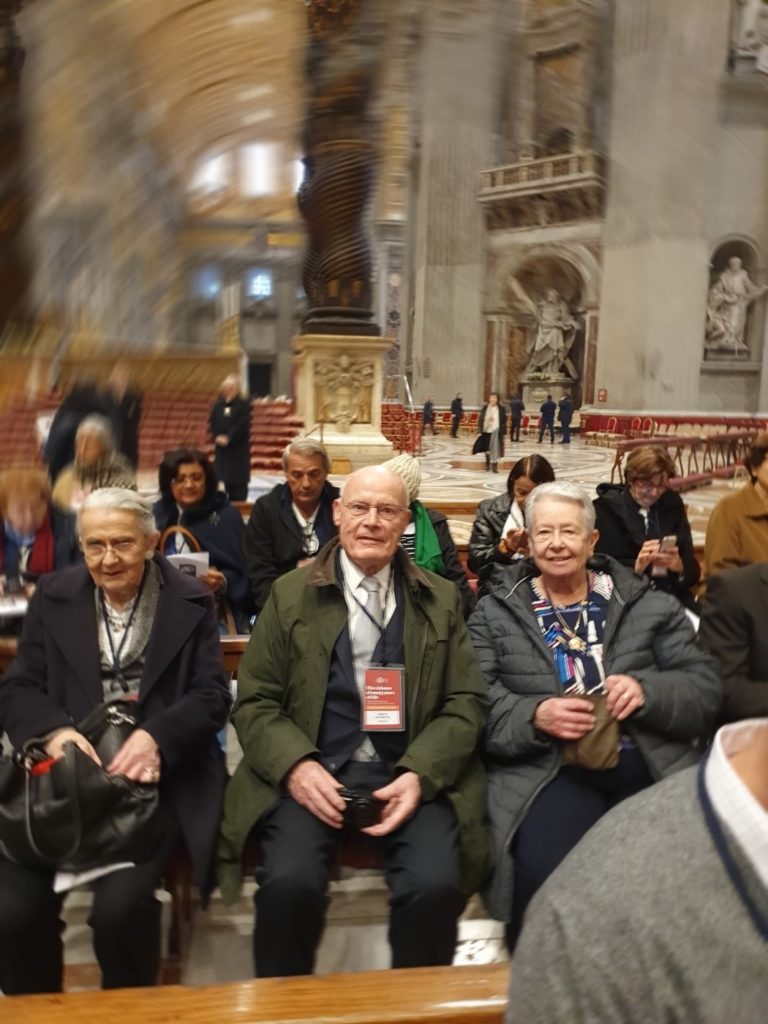The richness of many years of life’
International Congress of the Pastoral Care of the Elderly.
Rome 29-31 January 2020
1 An overall view
We were 550 participants, including 150 Brazilians, very few Asiatics, some tens of Africans, North Americans (USA, Canada) many Western Europeans from Italy, France, Belgium, Spain, Ireland… There were 2 Cardinals, 20 or so Bishops, 60-80 priests, many consecrated religious and very many lay people. Papers and their translations were given in 5 languages (Italian, Spanish, Portuguese, English and French)
Each of our branches of the Crescendo network was represented.
In short, a well-organised Congress, arranged by the Dicastery for Laity, the Family and Life, who number only 30 people!
The Dicastery put on line an account of each day’s talks and events as they occurred.
Copy this link into your internet browser : http://www.laityfamilylife.va/content/laityfamilylife/en.html‘
The conclusions reached by Mme Gambino at the end of the third session should be noted, in view of the reality of the situation on the ground.
The Secretary of the Dicastery promised that the content of all the speakers’ talks would be put on the Dicastery site within a few days.
On Friday 31st January, Mass was celebrated in St Peter’s Basilica, and was followed by an audience with the Pope, who gave a speech of encouragement, sending us out on our mission to the elderly. He shook the hand of each participant with a wide smile and a warmth of presence for each individual.
As a taster, I include the main points given by the two Cardinals, as they seem to me to be very important.
NB These are notes taken down verbatim from translated speech. Please refer to the definitive texts when these appear.
2 Introduction
‘The Church and the Elderly’
Cardinal Kevin Farrell, Prefect of the Dicastery.
The first essential is to put in place the pastoral ministry of the ear. There is a triple form of listening needed.
- Signs of the times
- The Church’s teaching
- Lived experience
Signs of the times
The demographic balance changes. People live longer – we cannot ignore it. Today in the world, the number of elderly people has doubled in 30 years. This poses spiritual questions of how to accompany the elderly in a pastoral sense. As the Pope says, we live in a throw-away culture. How can the Church encourage society to change its approach?
The Church’s teaching
During the 1980’s, John-Paul ll developed a promising pastoral approach, encouraging grandparents to take responsibility for the transmission onwards of faith. This transmission of faith is a challenge everywhere in the world. The role played by grandparents is precious and irreplaceable. We need to privilege inter-generational dialogue. This demands commitment and perseverance.
Lived experience
We, the Church, need to listen to you, older people. Different approaches need to be developed – (15-20 different initiatives in separate countries were cited)
We need to launch novel ways of dialogue. Pope Francis is against the culture of rejection. He calls it a mortal sin. Families have a great responsibility towards the elderly. We need to work for a change in attitude towards older people that is both human and pastoral in families known to us. Where an elderly person has no family, then the Christian community should take that place and support the person.
What direction should this pastoral care take? How are we to include this important percentage of the population in society?The laity of the future will increasingly consist of elderly people.
3 Opening of the third session
‘The vocation of the elderly within the Church’
Cardinal Jose Talentino de Mendonca
What criteria should one employ, if one were seeking a person to take part in that great adventure which is Salvation?
Someone who has within them the Covenant, and who is prepared to leave home territory and strike out somewhere new. We would in all probability choose someone young and vital, someone capable of vision.
But God surprises us; he chooses the improbable protagonist; an older person. All too often we tend to restrict the elderly to that bit of time at the end of their lives. Whereas, in the story of Salvation, God uses them as vital protagonists. In Genesis 12, we find Abraham at 75…
Abraham has been called by God to live out an unexpected challenge. God announces to this older person (and to all older people) that a new path awaits him. There are three fundamental elements.
- a) God asks Abraham to live a deep experience of faith. Our society tends to hector or bully the elderly. Old age is a difficult period – our translator called it ‘work’.
Frequently, older people have to re-learn basics that they have forgotten. To be old is to live as before, only more slowly. It is to have to give things up, to do more with lesser means. Frequently it is a struggle to have a conversation with 20% of former vocabulary. It may be to communicate only with the eyes, keeping alive the thread of love. Signs of extraordinary love.
However, it is not the end. It may be a beginning. Abraham lives out a nomadic life of faith. He learns trust. He does not know where he is going, but he remains faithful to the Covenant. To have faith is to live vulnerably, trusting in the Word. Gone is all that was stable. It is to face the challenge of going outside the usual boundaries of our lives. It is to open our lives to God’s surprises. Faith destabilises us. It is a call to live the itinerant life-style of a Covenant that is beyond our understanding. The believer is a pilgrim with empty hands and visionary eyes. - b) Abraham is an elderly person who lived childless with Sarah. Abraham perceives that here is a correspondence with trust in God. To believe is to trust, even where there is no proof. God asks us to have confidence in Him, because of Him. Faith tests us. Can I believe without a guarantee?
- c) Abraham becomes a father. We ourselves live in a period of crisis with regard to the transmission of faith to the next generations. We do not know where we are coming from. We feel that we have not been affirmed by the previous generation. The young see no intermediaries. The crisis in the transmission of faith is at all levels. We need to get back to essentials.
At the moment of Jesus’ baptism, the witnesses heard a voice coming from heaven. It is a word full of a confidence which is not announced, is not heard today. It is the act of transmission that teaches us who we are.
This transmission places man in a story. Humankind has a crucial need of this transmission. The elderly too have a most important mission – that of getting nearer to younger generations, and engendering a true spiritual life in them.

